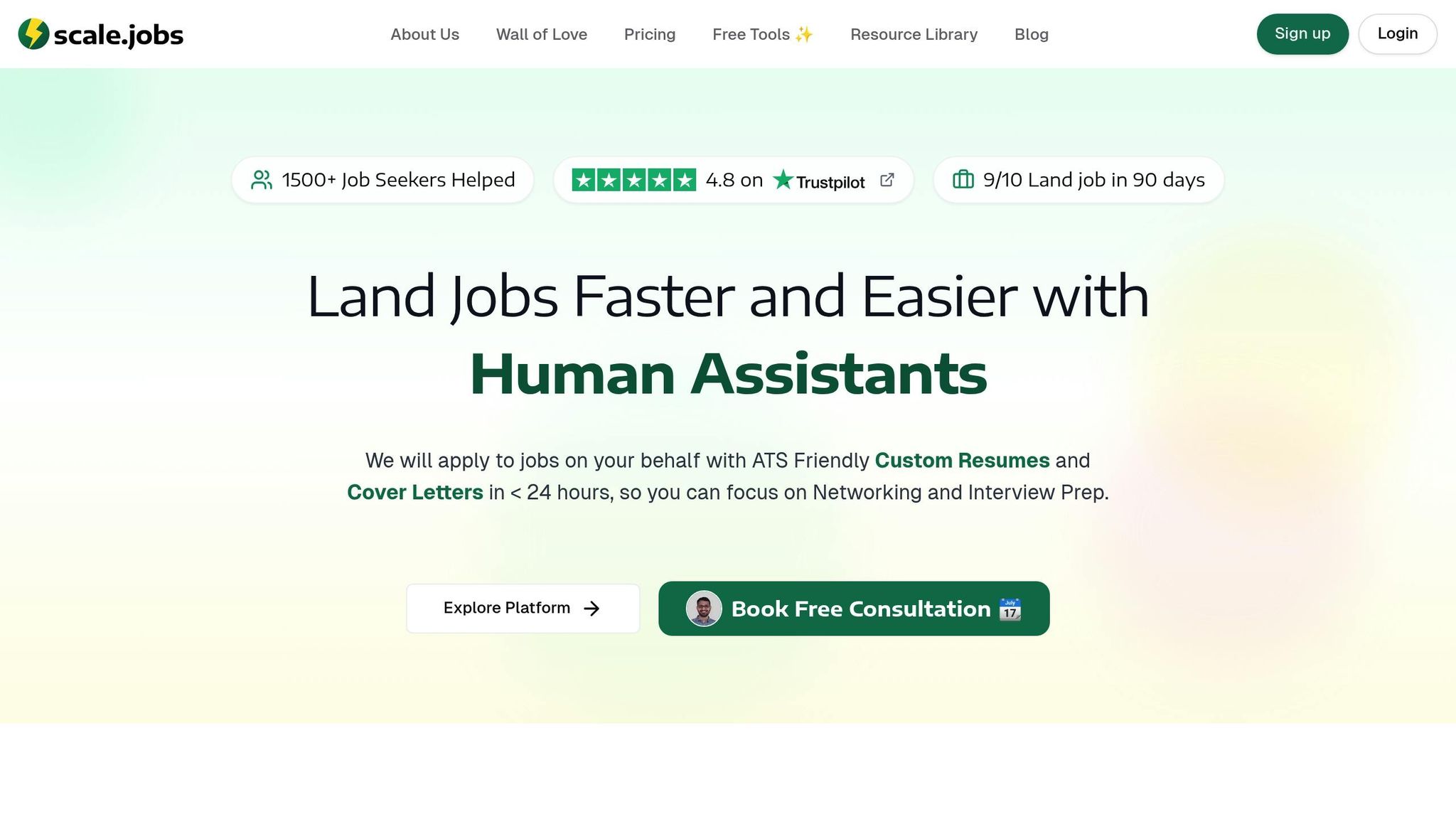How Certifications Boost Sustainability Careers
Certifications in sustainability enhance your skills, visibility in a competitive job market, and ability to navigate complex regulations.

Certifications are game-changers for professionals aiming to excel in sustainability-focused careers. Here's why they matter:
- Close the Skills Gap: Many candidates lack practical expertise, such as carbon accounting or compliance reporting. Certifications bridge this gap by offering focused, hands-on training.
- Stand Out in a Crowded Market: With fewer than 2% of applicants landing interviews for sustainability roles, certifications help you bypass automated resume filters and showcase specialized skills.
- Navigate Complex Regulations: Certifications simplify the challenge of keeping up with evolving sustainability standards, providing structured knowledge to manage compliance effectively.
Key Certification Areas:
- General Sustainability: Broad knowledge for newcomers or those transitioning careers.
- Climate/Environmental Focus: Training on climate science, risk management, and policies.
- ESG and Finance: Integrating environmental, social, and governance factors into corporate strategies.
- Energy and Decarbonization: Expertise in renewable energy and carbon reduction.
- Reporting and Disclosure: Skills for creating compliant sustainability reports.
To truly benefit from certifications, pair them with a targeted job search strategy. Platforms like scale.jobs ensure your credentials are highlighted effectively, tailoring resumes and applications to specific roles. This approach combines certifications with personalized job search tools to increase your chances of landing a sustainability role.
Which Sustainability Certification Is Right for Your Career? | A Strategic Guide
Main Problems Facing Sustainability Professionals
These challenges highlight why earning professional certifications can make a big difference.
Skills Shortage in Sustainability
One of the biggest hurdles in the sustainability field is the mismatch between academic knowledge and the practical skills employers need. While many graduates come armed with degrees in environmental science or climate change, they often lack hands-on experience with industry tools and processes. For instance, training on reporting frameworks or conducting energy audits is often missing. Decarbonization courses may focus heavily on the science but skip over practical skills like using carbon accounting tools or managing supply chain software. This gap in practical expertise makes an already competitive job market even tougher for candidates.
Dealing with a Competitive Job Market
The sustainability job market is becoming increasingly cutthroat, with a limited number of positions attracting a flood of qualified candidates. In the U.S., fewer than 2% of applicants manage to land an interview for these roles. Making matters worse, most large companies - 99% of Fortune 500 firms - rely on Applicant Tracking Systems (ATS) to sift through resumes. This means even highly skilled professionals can be overlooked if their resumes aren’t tailored to pass these automated filters.
Complex Regulations and Multi-Field Requirements
Sustainability professionals face the daunting task of keeping up with constantly changing regulations and reporting standards. These requirements vary widely depending on the industry, location, and size of the company. Professionals often need to juggle multiple frameworks and compliance rules at once, which can feel overwhelming. On top of a solid background in environmental science, they’re expected to have skills in data analytics, project management, and stakeholder engagement. Staying on top of evolving regulations and weaving together diverse guidelines is no small feat. Certifications can help simplify this complexity by providing a standardized set of skills and knowledge to meet these challenges.
How Certifications Fix These Problems
Certifications offer practical solutions to the challenges we’ve discussed, such as bridging the skills gap, standing out in a competitive job market, and managing compliance across multiple fields. They serve as proof of specific skills and professional readiness, reassuring employers of a candidate’s expertise and commitment to staying current. Let’s explore how certifications validate skills, create new career opportunities, and simplify compliance - key factors for advancing in sustainability-focused careers.
Proving Your Skills Through Certifications
Certifications act as a stamp of approval for the real-world skills needed in sustainability roles. They show that a professional has completed relevant, focused training and is equipped to handle industry-specific challenges. Many certification programs also require ongoing education, ensuring participants remain up-to-date with the latest practices and standards.
Expanding Career Opportunities
Having validated skills can open doors to better career prospects. Sustainability certifications signal to employers that you’re prepared for specialized roles, making you a stronger candidate. In fact, some job postings now list specific certifications as preferred qualifications. Beyond boosting your resume, certifications can also expand your professional network and increase eligibility for niche roles.
Navigating Compliance and Reporting
Certifications are especially helpful in guiding professionals through the complex world of compliance and reporting. With sustainability regulations constantly evolving, certification programs provide structured training to help professionals understand and meet these requirements. This knowledge is invaluable in staying ahead of regulatory changes and maintaining compliance.
While sustainability certifications are a valuable tool for career growth, their impact depends on the specific area of sustainability you’re pursuing and your personal career goals. They’re best seen as part of a broader strategy for professional development.
Best Sustainability Certifications to Get
Sustainability certifications are tailored to different areas of expertise, so it’s important to choose one that aligns with your role, industry, and career aspirations. Here’s a breakdown of some key certification categories:
General Sustainability Certifications
These certifications provide a broad overview of topics like environmental management, social responsibility, and sustainable economic practices. They’re ideal for those just starting in the field or professionals transitioning into sustainability roles.
Climate and Environmental Certifications
Focusing on climate science, policy, and environmental risk management, these certifications are for individuals dedicated to tackling climate change and ensuring adherence to environmental regulations.
ESG and Finance Certifications
For professionals in finance and corporate sectors, these certifications emphasize integrating environmental, social, and governance (ESG) factors into investment strategies and decision-making processes.
Energy and Decarbonization Certifications
These credentials center on energy efficiency, renewable energy practices, and carbon reduction strategies. They’re especially relevant for those working on advancing the shift to a low-carbon economy.
Reporting and Disclosure Certifications
Designed to equip professionals with the skills to create sustainability reports that comply with emerging standards and regulations, these certifications are crucial as reporting requirements continue to evolve.
Each certification type validates specialized expertise and helps boost career opportunities in sustainability. Consider your industry’s demands and your career goals to choose the certification that best complements your professional path. Adding these credentials to your resume can make a significant difference in your career development.
Certification Plus Job Search Strategy: Building Your Career
Why Combine Certifications with Focused Job Search
Earning sustainability certifications is a great start, but they’re just one piece of the puzzle. To truly make an impact in your career, you need to pair these credentials with a targeted job search strategy. Certifications can grab the attention of hiring managers, but how you present them is what gets you in the door.
Sustainability roles often require specialized skills that many candidates lack. Combining certifications like LEED AP or GRI Standards with carefully tailored applications sets you apart from the crowd. Employers immediately recognize that you bring expertise in navigating complex regulations, reporting standards, and industry-specific challenges.
The problem is, many professionals with certifications rely on outdated job search methods, missing out on roles where their expertise could give them an edge. A focused strategy - backed by tools designed for this purpose - can make all the difference, such as those offered by platforms like scale.jobs.
Using scale.jobs to Speed Up Your Job Search

While services like Find My Profession and LazyApply offer job search assistance, they fall short when it comes to showcasing specialized certifications in sustainability. Find My Profession focuses on resume writing, while LazyApply automates applications, often leading to generic results and spam filter issues.
Scale.jobs takes a smarter approach, blending human expertise with AI-powered customization. Their virtual assistants know how to strategically position sustainability certifications across different job applications. Unlike LazyApply’s automated bots, scale.jobs uses human-managed applications to ensure your qualifications are highlighted in ways that resonate with hiring managers.
What sets scale.jobs apart is their flat-fee pricing model, which avoids the subscription trap many competitors rely on. Instead of recurring monthly costs, you pay a one-time fee. For example, their Basic plan costs $199 and includes 250 job applications with personalized human support. Compare that to Find My Profession, which charges similar amounts just for resume writing, without any application assistance.
| Feature | scale.jobs | Find My Profession | LazyApply |
|---|---|---|---|
| Application Method | Human-managed applications | Resume writing only | Automated bot applications |
| ATS Optimization | Custom resume per application | One-time resume creation | Generic template applications |
| Pricing Model | Flat-fee campaigns ($199-$1,099) | $395-$795 per resume package | $49-$129/month subscriptions |
| Transparency | WhatsApp updates + proof screenshots | Limited communication | Minimal reporting |
| Sustainability Focus | Tailored for sustainability expertise | General approach | No specialization |
The real-time WhatsApp updates and proof-of-work screenshots provide clear visibility into the application process. You’ll know exactly how your certifications are being presented and which roles are generating interest, giving you confidence in your career transition.
Adding Certifications to Your Job Applications
Strategically incorporating your certifications into job applications is key to standing out. It’s not just about listing every credential - it’s about aligning the most relevant ones with the specific job requirements.
On your resume, place your most applicable certification prominently in your professional summary. For example, if you’re applying for ESG-focused roles, lead with certifications like the CFA Institute Certificate in ESG Investing. For positions in environmental compliance, emphasize credentials like ISO 14001 Lead Auditor certification. Scale.jobs’ AI tools ensure these certifications are positioned perfectly for each role.
In your cover letter, tie certifications directly to job-specific challenges. For instance, explain how your LEED AP certification contributed to measurable project success. The platform’s AI-powered cover letter generator helps weave these details into compelling narratives that resonate with hiring managers.
For interviews, prepare examples that show how your certifications have solved real-world problems. Share stories that highlight the practical application of your expertise. Scale.jobs even offers interview prediction tools to help you anticipate certification-related questions based on the job and company you’re targeting.
The platform’s application tracking tools let you see which certifications are driving the most interview requests. This data helps you refine your strategy, focusing on the credentials that deliver the best results for your career goals. By combining certifications with a smart, targeted job search, you’ll position yourself for success in the sustainability field.
Conclusion: Building Success in Sustainability Careers
Sustainability certifications close the skills gap that often leaves professionals unprepared for tackling ESG reporting, climate risk assessments, and navigating regulatory compliance. They serve as concrete evidence of your expertise in this ever-evolving field.
While many may claim to understand sustainability, certified professionals stand out by meeting recognized standards like GRI, LEED, or CFA Institute ESG credentials. This distinction becomes increasingly important as sustainability roles expand across industries - from managing renewable energy projects to shaping corporate ESG strategies. However, earning these credentials is just the first step; knowing how to strategically apply and present them is equally critical.
Simply having certifications isn’t enough. Success lies in effectively connecting your qualifications to real-world business needs. Even the most qualified candidates may struggle if they fail to demonstrate how their credentials solve specific challenges.
This is where Scale.jobs comes in. They ensure your certifications are positioned to maximize impact across every application. Their team of experts tailors how credentials like LEED AP are presented - differently for construction-focused roles versus corporate sustainability positions. Unlike automation-heavy services, Scale.jobs offers a personalized approach with transparent, flat-fee pricing. For $199 to $1,099, you get full campaign management, real-time WhatsApp updates, and proof-of-work screenshots to keep you in the loop.
FAQs
What sustainability certifications can help me stand out in a competitive job market?
Earning certifications in sustainability can be a smart move to elevate your career, showcasing your expertise in specialized areas and your dedication to environmental and social responsibility. Here are some of the most respected certifications in the field:
- LEED Accredited Professional (LEED AP): Focuses on green building practices and sustainable design principles.
- Certified Sustainability Professional (CSP): Covers a wide range of sustainability strategies and practices.
- ISO 14001 Environmental Management Certification: Highlights skills in implementing and managing environmental management systems.
- GRI (Global Reporting Initiative) Certification: Demonstrates knowledge in sustainability reporting and fostering transparency.
These certifications not only help fill knowledge gaps but also give you a competitive edge in the job market. To further enhance your career prospects, platforms like scale.jobs offer tools such as AI-crafted resumes, tailored cover letters, and expert support to help your application stand out.
How can I showcase my sustainability certifications in job applications to stand out to employers?
When showcasing your sustainability certifications, make them easy to spot by listing them prominently in the skills or certifications section of your resume. For each job application, customize your approach by linking these certifications to the specific role, illustrating how they strengthen your qualifications for the position.
In your cover letter, highlight how these certifications have equipped you to address sustainability challenges and align with the company’s goals. Use clear and impactful language to convey the unique value you bring to their team.
How do sustainability certifications help professionals stay compliant with regulations and reporting standards?
Sustainability certifications offer professionals a solid foundation to navigate the intricate landscape of environmental regulations and reporting requirements. These programs deliver structured training on key industry standards, including greenhouse gas protocols, ESG reporting frameworks, and compliance with both local and international laws.
Earning these certifications does more than just deepen a professional's expertise - it highlights their dedication to staying updated on shifting sustainability practices. This commitment can set them apart in a competitive job market, showcasing their readiness to tackle modern environmental challenges.




